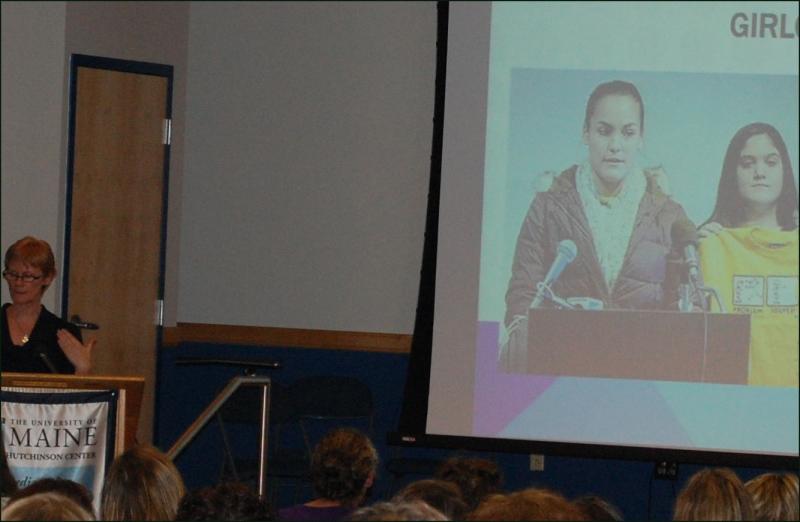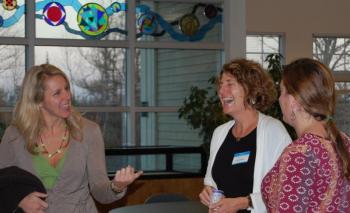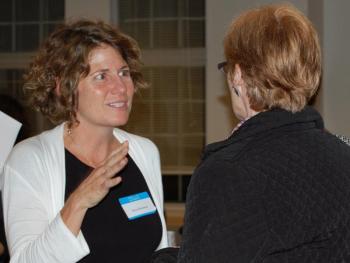In Belfast: Creating a new road map for mothers and daughters
BELFAST — Conventional wisdom tells us that adolescence is a tumultuous time, especially for mothers and daughters. We prime ourselves for conflict, joke about its inevitability, and expect the worst. But who ever said that conventional wisdom is wise?
The Maine Mother-Daughter Project takes on these false beliefs by creating communities that simultaneously nurture mothers, daughters, and mother-daughter relationships. The Project includes a free film series, starting with the screening of A Girl’s Life on Nov. 15, and more scheduled for January, March and May at the Hutchinson Center in Belfast.
'We all need to learn how to navigate these adolescent years. The more informed we are, the more connected we are with other mothers, the better we’ll all do.
— Kim Huisman, Associate Professor of Sociology, UMaine and Coordinator of the Maine Mother-Daughter Project
With the support of the University of Maine and a grant from the Maine Humanities Council, Kim Huisman, Associate Professor of Sociology, UMaine and Coordinator of the Maine Mother-Daughter Project organized a Conference for Women on Cultivating Strong Bonds with Our Daughters to kick off the Project. The Conference drew approximately 50 participants, but the Project’s real power will come from the ongoing film series and the creation of small Mother-Daughter Groups that support girls and their mothers throughout adolescence.
The premise, first described in a book by SuEllen Hamkins and Renée Schultz, is that mothers and daughters need support to thrive. Together, these groups counter the commercialized, hyper-sexualized image of adolescence with communities of real girls, with real interests, real bodies, and real friends.
Huisman fostered three mother-daughter groups in the months leading up to the conference, including one that includes her and her own daughter.
“This project really is a coalescing of all of my personal and professional interests,” she said.
Representatives from each group served as resources at the conference. They described monthly meetings exploring friendship, bodies, and menstruation, and recounted activities like designing their own jeans and howling at the moon together.
“It’s about being in the moment with our daughters,” said Hannah Webber, whose active Mother-Daughter group is entering its fourth year.
As the mother of a young daughter, I was on the edge of my seat throughout the conference. It was an emotional roller coaster from despair — how will I ever raise a strong, healthy daughter in the face of sexy cartoon characters and “anti-aging makeup” for eight to 12 year olds? — to euphoria: Together, mothers and daughters are doing great things!
Both emotions stemmed from the keynotes address of Lyn Mikel Brown, the Colby College professor who exposed the commercialization of childhood in Packaging Girlhood: Rescuing Our Daughter’s From Marketers’ Schemes. Brown explained how these schemes use the language of empowerment while limited girls’ choices to the power to shop, to appeal to boys, and to fight with other girls. There was a palpable sense of dismay among the crowd as the slides of padded bikinis for toddlers and sexy Halloween costumes for teens paraded across the screen.
“Thongs for toddlers, help us!,” said Charlotte Dixon, who attended the conference and is the mother of a six-year-old girl. “I feel lucky to be somewhat insulated from the worst of the horrors, at least for the time being, but I’m also fearful that these cultural norms are so pervasive that I've become blind to them. What messages am I missing that might undermine the values I'm trying to promote?”
Luckily, Brown didn’t just describe what’s wrong. As the cofounder of the organization Hardy Girls Healthy Women shared the inspiring work of activist girls and the organizations that support them, the mood lifted.
Dixon appreciated the introduction to organizations committed to empowering youth to think critically and become socially engaged online and off.
"This generation has access to social networks large enough to change world views but we have to work hard to help them engage wisely and morally,” she said.
By the end of the evening, I was ready to join every group Brown described. (Honestly, I’m ready to sign my seven-year-old up for Colby just so Brown can be her teacher.) Overwhelmed with possibilities rather than anxiety, but overwhelmed nonetheless, I was even more grateful that the Maine Mother-Daughter Project has a clear next step.
A series of five films about the issues facing adolescent girls will help continue the conversations that began at the conference, with panelists that include Tess and Michele Walter, a mother-daughter pair who have told their story about cyber-bullying; Kay Stephens, co-author of the new book, Cyberslammed; and representatives from the Midcoast Maine Restorative Justice Project.
In creating opportunities to look more closely at the social forces that influence mothers and daughters, Huisman has provided a road map for mothers and daughters to strengthen their connections with each other and their communities.
“I’ve always been interested in public sociology, in bringing research beyond the university walls and into our communities,” said Huisman. “The University of Maine has a growing commitment to community engagement, and that climate is very supportive of this kind of work.”
Huisman is working on a second grant that would fund more programming and perhaps build a Hardy Girls Healthy Women presence in Belfast.
Whatever Huisman develops next, a Mother-Daughter group is clearly in the future for my family and friends. Maybe we join forces to replicate the Adventure Girls program that encourages girls in Waterville and Bangor to explore STEM-oriented physical activities. Maybe we form a Mighty Girl Bookclub, bonding while we read and talk about tough issues. Maybe we take a lesson from Hannah Webber’s group and build models of our bodies out of fruit. Whatever happens, my daughter and I won’t be alone.
Kathleen Meil lives in Rockville.




























